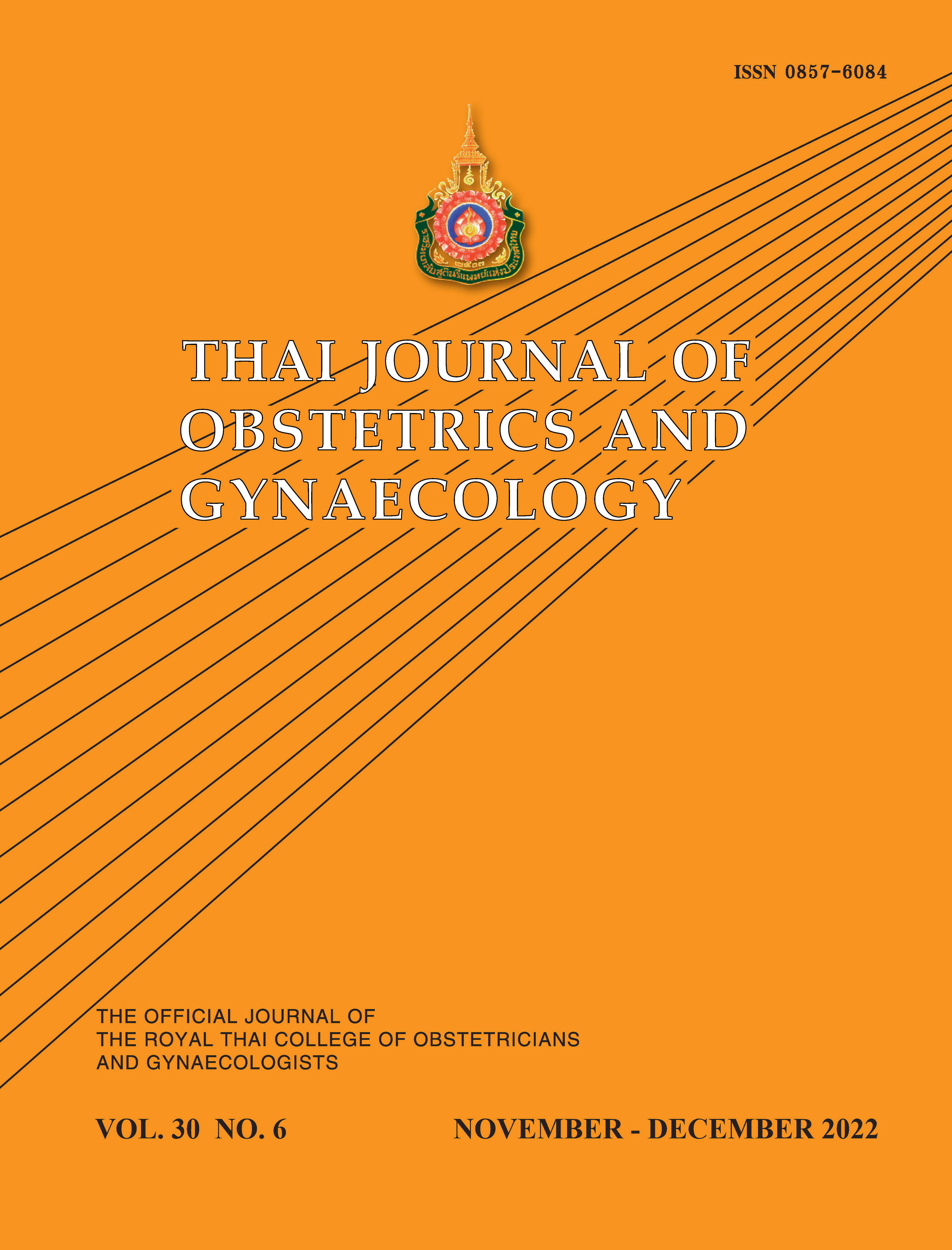Enhanced recovery after surgery protocol and the Factors associated with Prolonged Hospitalization in major Gynecologic surgery at Suratthani Cancer Hospital
Main Article Content
Abstract
Objectives: To evaluate the effectiveness and safety of our adopted enhanced recovery after surgery (ERAS) program for elective major gynecologic surgery at Suratthani cancer hospital and identified the factors contributing to prolonged hospitalization.
Materials and Methods: In this retrospective study, all patients who underwent major gynecologic surgery at Suratthani cancer hospital from July 2016 to December 2020 were included. We defined prolonged length of stayed group as those above medians of length of hospitalization and identified the risk factors that associated to this group.
Results: Two hundred and fifty patients who underwent major gynecologic surgery at Suratthani cancer hospital, were included. The median length of post-operative hospital stay was 3 days. And 86 (34.4%) patients have more than 3 days of post-operative hospital stay. The factors that associated with prolonged hospital stay were high body mass index (BMI), high American Society of Anesthesiologists (ASA) classification, disease of cervix, Radical hysterectomy with pelvic node dissection (RHND) operation, extremely blood loss, prolonged operative time and complication from surgery.
Conclusion: Our ERAS program showed some potentials of patient care in major gynecologic surgery. The risk factors that associated with prolonged hospital stay in this study were mostly non-modifiable. This result will be used to improve our ERAS program and promote the use the ERAS program in major gynecologic surgery.
Article Details

This work is licensed under a Creative Commons Attribution-NonCommercial-NoDerivatives 4.0 International License.
References
Kehlet H. Multimodal approach to control postoperative patho-physiology and rehabilitation. Br J Anaesth 1996;78:606-17.
Kehlet H, Wilmore DW. Fast-track surgery. Br J Surg 2005;92:3-4.
Arumainayagam N, McGrath J, Jefferson KP, Gillatt DA. Introduction of an enhanced recovery protocol for radical cystectomy. BJU Int 2008;101:698-701.
Hall TC, Dennison AR, Bilku DK, Metcalfe MS, Garcea G. Enhanced recovery programmes in hepatobiliary and pancreatic surgery: a systematic review. Ann R Coll Surg Engl 2012;94:318-26.
Husted H, Troelsen A, Otte K, Kristensen BB, Holm G, Kehlet H. Fast-track surgery for bilateral total knee replacement. J Bone Joint Surg Br 2011;93B:351-6.
Muehling B, Schelzig H, Steffen P, Meierhenrich R, Sunder-Plassmann L, Orend KH. A prospective randomized trial comparing traditional and fast-track patient care in elective open infrarenal aneurysm repair. World J Surg 2009;33:577-85.
Kalogera E, Bakkum-Gamez JN, Jankowski CJ, Trabuco E, Lovely KJ, Dhanorker S, et al. Enhanced recovery in gynecologic surgery. Obstet Gynecol 2013;122(2pt1):319-28.
Bisch SP, Jago CA, Kalogera E, Ganshorn H, Meyer LA, Ramirez PT, et al. Outcomes of enhanced recovery after surgery (ERAS) in gynecologic oncology – A systematic review and meta-analysis. Gynecol Oncol 2021;161:46-55.
Bhandoria GP, Bhandarkar P, Ahuja V, Maheshwari A, Sekhon RK, Gultekin M, et al. Enhanced recovery after surgery (ERAS) in gynecologic oncology: an international survey of peri-operative practice. Int J Gynecol Cancer 2020;30:1471-8.
Nelson G, Bakkum-Gamez J, Kalogera E, Glaser G, Altman A, Meyer LA, et al. Guidelines for perioperative care in gynecologic/oncology: enhanced recovery after surgery (ERAS) Society recommendations-2019 update. Int J Gynecol Cancer 2019;29:651-68.
Agrawal S, Chen L, Tergas AI, Hou JY, St.Clair CM, Ananth CV, et al. Characteristics associated with prolonged length of stay after hysterectomy for benign gynecologic conditions. Am J Obstet Gynecol 2018;219:89.e1-89.e15.
Wijk L, Franzen K, Ljungqvist O, Nilsson K. Implementing a structured enhanced recovery after surgery (ERAS) protocol reduces length of stay after abdominal hysterectomy. Acta Obstet Gynecol Scand 2014;93:749-56.
Gerardi MA, Santillan A, Meisner B, Zahurak ML, Diaz Montes TP, Giuntoli RL, et al. A clinical pathway for patients undergoing primary cytoreductive surgery with rectosigmoid colectomy for advanced ovarian and primary peritoneal cancer. Gynecol Oncol 2008;108:282-6.
Joshi TV, Bruce SF, Grim R, Buchanan Jr T, Chatterjee-Paer S, Burtonet ER, et al. Implementation of an enhanced recovery protocal in gynecologicd oncology. Gynecol Oncol Rep 2021;36:100771.
Eberhart LHJ, Koch T, Ploger B, Wagner U. Enhanced recovery after major gynaecological surgery for ovarian cancer – an objective and patient-based assessment of a traditional versus a multimodal “fast track” rehabilitation programme. Anesthesiol Intensiv Med 2008;49:180-94.
Chapman JS, Roddy E, Ueda S, Brooks R, Chen LL, Chen LM. Enhanced recovery pathways for improving outcomes after minimally invasive gynecologic oncology surgery. Obstet Gynecol 2016;128:138-44.
Gil-Moreno A, Carbonell-Socias M, Salicru S, Bradbury M, García A, Vergés R, et al. Nerve-sparing versus non-nerve-sparing radical hysterectomy: surgical and long-term oncological outcomes. Oncotarget 2019;10(44):4598-608.
van Gent MDJM, Romijn LM, van Santen KE, de Kroon CD. Nerve-sparing radical hysterectomy versus conventional radical hysterectomy in early-stage cervical cancer. A systermatic review and meta-analysis of survival and quality of life. J. maturitas 2016;94:30-8.


